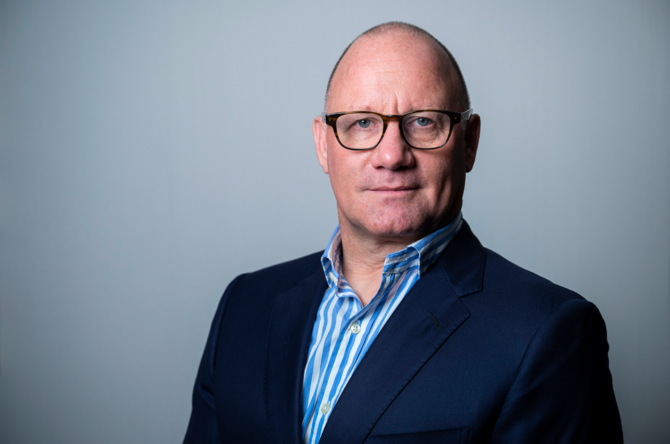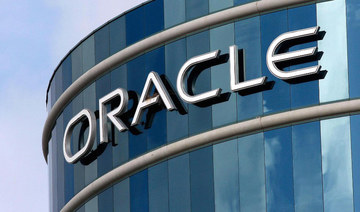RIYADH: Aiming to meet the growing demand for its cloud services, Oracle plans to open a third public cloud region in Saudi Arabia, the company’s senior vice president, technology cloud, Middle East and Africa, told Arab News in an exclusive interview.
“Saudi Arabia is a very high priority for Oracle right now,” said Nick Redshaw. “We’re seeing unprecedented growth in the region, which is tremendous and LEAP 2023 will reiterate our commitment to that unprecedented growth with what we think are unprecedented investments and expansion and innovation into the Kingdom and the region.”
Oracle unveiled its expansion plans at LEAP 2023 International Technology Conference, which is taking place in Riyadh from Feb. 6-9.
Redshaw added: “Oracle is going to invest $1.5 billion in Saudi Arabia to meet the unprecedented acceleration of cloud computing and demand that we’re seeing in the Kingdom. We are also going to expand our first (public cloud) region in the Kingdom, which is in Jeddah, to provide incremental capacity to service the current demand.
“In addition, we are opening a new public cloud region in Riyadh.”
The opening of the new region in the Saudi capital will “take our total to six across the Middle East and three regions in the Kingdom,” the official said.
He said the Riyadh region will primarily service the expanding requirements of the Kingdom’s eastern region and Oracle’s government clients who are predominantly based in Riyadh.
The cloud region in Riyadh will join the existing regions in Jeddah and the futuristic city of NEOM.
This investment was earlier included in a memorandum of understanding that was signed during Oracle CEO Safra Catz’s recent visit to Riyadh in the presence of Haytham Al-Ohali, vice minister at the Ministry of Communications and Information Technology.
“The aim here is to help the government and businesses take advantage of all the latest innovation in the cloud and digital transformation that we can deliver,” said Redshaw.
As part of the MoU, Oracle will work with MCIT and the Communications and Information Technology Commission to establish a commercial and operational model for an additional cloud region in Saudi Arabia that is aligned with the Saudi government’s requirements and local data residency regulations.
Meeting unprecedented demand
“We’re seeing an unprecedented rise in cloud computing across the whole region, particularly in Saudi Arabia,” said Redshaw.
Indeed, according to IDC — a global provider of market intelligence — public cloud spending in Saudi Arabia will increase at a compounded annual growth rate of 26.8 percent over the coming years to reach $3.1 billion in 2026, spurred by organizations looking to leverage the power of the cloud to modernize their critical business applications and become cloud native.
Redshaw continued: “I anticipate it to grow even more rapidly over the next few years.”
With regard to the rise of cloud adoption, he said, it’s all about organizations wanting to transform.
“Cloud adoption is making them more cost-efficient, more secure, more agile, more flexible as businesses as they capitalize on cloud,” he explained. “You’ve got the Kingdom’s demand going up, cloud transformation going up, and then really innovating as businesses on top of that to take advantage of it.”
Creating job opportunities
Asked how the new initiatives are likely to impact the job market, Redshaw explained, that since the Kingdom’s Vision 2030 is continuing at a fast pace, it is enabling businesses to transition to the new digital environment and take advantage of technology to drive business outcomes and innovation.
“Whether it’s Jeddah or Riyadh, what we’re doing is providing the capability to take advantage of that demand which is very strong,” he said.
Redshaw went on to list a couple of measures that Oracle is taking within the Kingdom to foster and promote talent.
“One is around skills enablement and building capability, both in businesses, in engineering, in startups,” he said. “We have a number of programs running where we bring in young individuals, train them, educate them, and then they can go back into the broader technology market and take advantage of that innovation.”
He also mentioned the Oracle Academy where educators from around the globe work with institutions in the Kingdom to build learning programs.
“In addition, we have innovation hubs we’ve built — in Riyadh and the UAE as well,” he continued. “This is where people can meet. We put experts in there. They can brainstorm, train and figure out how to take advantage of all the technology.”
Read More: Oracle opens Riyadh tech hub

Oracle headquarters campus in Silicon Valley, Redwood City, CA, USA. (Shutterstock)
Focus on sustainability
Underscoring its ongoing focus on sustainability, Oracle is committed to powering all its cloud regions worldwide with 100 percent renewable energy by 2025.
Several Oracle cloud regions, including regions in the North and South Americas, and all 10 regions in Europe, are already powered by 100 percent renewable energy, which enables customers to run their computing services more sustainably and with a lower carbon footprint.
To further advance its commitment to sustainable operations, Oracle recycled 99.9 percent of its retired hardware in 2022.
“We’re very proud of the sustainability plan that we have and everything we roll out, we roll out consistently worldwide, including Saudi Arabia,” informed Redshaw.
He added: “We stand committed to our goal of achieving 100 percent renewable energy in all the next-generation cloud regions by 2025 and that would include Riyadh, Jeddah, and all the ones we are bringing on board in the region. We also do a lot around the hardware recycling, so that’s our continued effort to reduce e-waste.”
“We also decreased the amount of waste sent to landfill in Oracle-owned buildings by 25 percent per square foot since 2015,” Redshaw continued. “In addition, we do a lot of work around responsible sourcing and by 2025 the aim is that 100 percent of our key suppliers will also have an environmental program in place.”
Not surprisingly, according to him, Oracle is well on its way to achieving its aim of net-zero emissions by 2050.
Redshaw concluded by saying that they apparently found that 95 percent of businesses believe they make more progress toward sustainability and social goals with the help of artificial intelligence.
“When you look at technological capability and how people take advantage of it and innovate, there’s a lot you can do with data and AI to actually make your business more sustainable as well,” he said.















